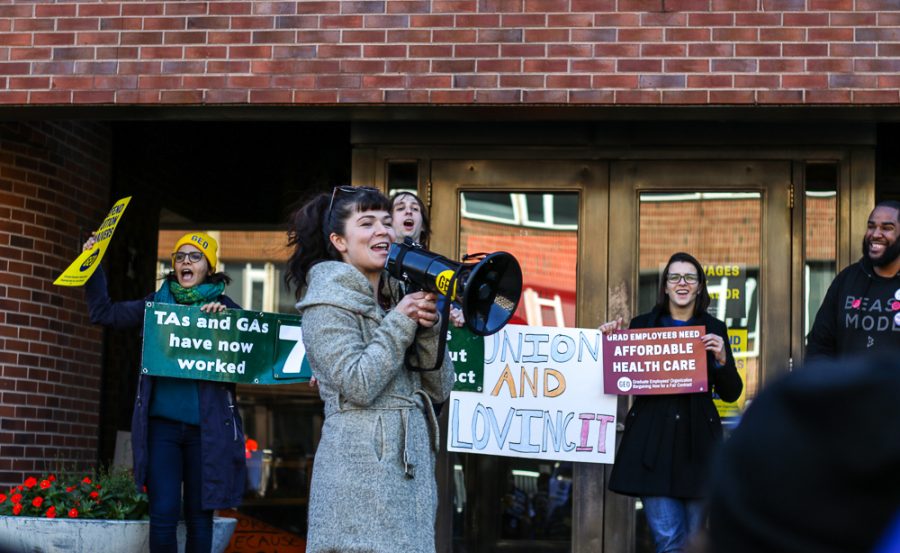Reflecting on the Graduate Employees’ Organization’s semester of protests
Christina De Angelo, instructor in the Department of Spanish and Portuguese, speaks at the Graduate Employees’ Organization protest in front of the Swanlund Administration Building on Thursday.
Dec 18, 2017
Despite holding its first bargaining session March 30, the Graduate Employees’ Organization, the University’s graduate employee union, and the University Administration have still not reached full agreement on a new contract.
Gus Wood, co-president of the GEO, said they have seen only minor advancements in the bargaining room this past semester, and the big ticket items, like wages, healthcare, tuition waivers and childcare, have yet to be settled.
Although the cost of housing, food and transportation in the area have increased, graduate employees’ wages have not kept up and have only increased by 2 percent in the last five years, said Katharine Lee, a member of the GEO’s bargaining committee, in an email.
The GEO’s contract proposal also looks to protect healthcare of graduate employees and tuition and fee waivers, which allow employees to work without paying for tuition or fees, she said.
Recently, the GEO experienced one of its first major successes by signing a memorandum that will reimburse $100,000 to graduate employees of the Masters in Computer Sciences program. In 2014 and 2015, these graduate employees were wrongfully denied teaching assistant positions and were made to pay tuition, Lee said.
Get The Daily Illini in your inbox!
Despite not seeing much progress in the way of bargaining, Wood said they have seen a lot of progress as a union.
“The last 60 days have been an awakening on this campus for GEO,” he said.
Many people are turning toward GEO because they believe the time is right to improve the issues experienced by teaching assistants, he said. They have even seen increased membership from engineering and STEM fields, areas not normally represented by GEO.
Wood said he attributes a lot of the increased interest in GEO to the well-organized events the organization has held this semester.
On Oct. 26, the GEO held a sit-in and rally at the Swanlund Administration Building, an event organized to bring graduate employees and students together and draw attention to the group’s demand for a fair contract.
Morgan Shafter, a graduate student in LAS, attended the event and showed his support by occupying Swanlund’s lobby. He was one among many other people at the rally who said they felt the University was “unwilling to bargain” with the GEO and who could not understand why, considering the graduate employees’ importance to the University.
“Graduate employees teach the undergraduate classes and are a very important part of the University,” Shafter said. “They should be helping us out. We shouldn’t have to fight this hard.”
Robin Kaler, associate director for public affairs, said that bargaining is a collaborative process, and they have been working with the GEO for some time.
Kaler said the University values contributions made by teaching assistants and graduate students.
“The University remains optimistic that the GEO and the University will be able to attain a collective bargaining agreement that is fair and functional for both sides,” Kaler said.
Lee said that, more than anything, the sit-in and rally demonstrated GEO’s seriousness and willingness to fight for a fair contract.
After conducting the sit-in, Wood said the administration did not sit as firmly on its unwillingness to bargain, and the provost started to attend the group’s sessions more actively. He said certain members of the GEO who had previously been more passive became “ignited.”
Wood said some of the successes the GEO has seen in its negotiations would not be possible without taking this type of organized action.
“I don’t think we would have gotten that $100,000 arbitration win, if we did not do those sorts of actions,” he said.
On Dec. 14, the GEO will take action again by occupying the Illini Union overnight and offering tutoring to students.
The GEO took a similar action in 2012, when they were bargaining for their previous contract, ultimately leading to the contract being settled. Wood said he hopes to get a similar response from Thursday’s session.
As time progressed and the members took more organized action, the GEO’s focus flipped from just getting a satisfactory contract to attaining something greater, Wood said.
“We went from being hopeful of getting a good contract to being hopeful of how great of a contract can we get now,” Wood said.
If they can win a fair contract, he said, that protects the economic stability and restores respect to graduate employees at the University. That win will reverberate to universities and unions across the country.






